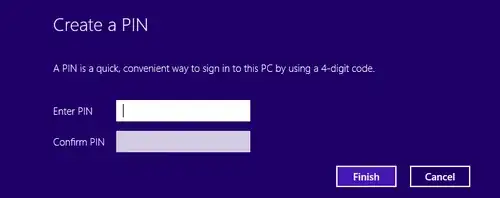Windows 8 has got a new feature that allows you to login to your computer using a 4-digit PIN code:

Over the years we've been taught that we should always protect our accounts with secure passwords that consist of both lower- and uppercase letters and digits and have a length of at least 7-10 characters. The new PIN policy contradicts with this idea.
If we're actually able to set a 4-digit password (and in Windows 8 we are), how is that different from the PIN-code? In my opinion, the PIN actually tells the intruder "hey, the owner only used a 4-digit password, so use the alphabet of 0-9 for your brute-force attack, it will be much faster".
To have a more convenient way to sign in, we can also set a 3-, or even a 2-digit password, which is not possible for a PIN code.
So what is the exact purpose of the feature, if it's definitely less secure and not more convenient than the good old password?